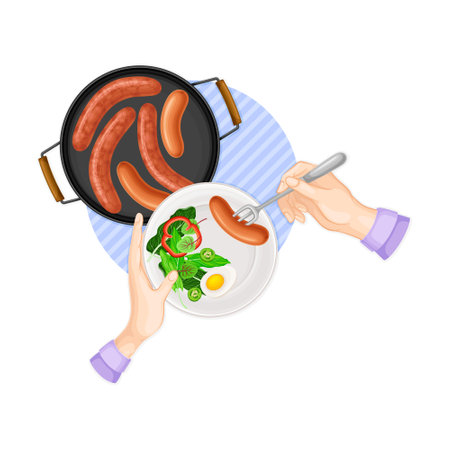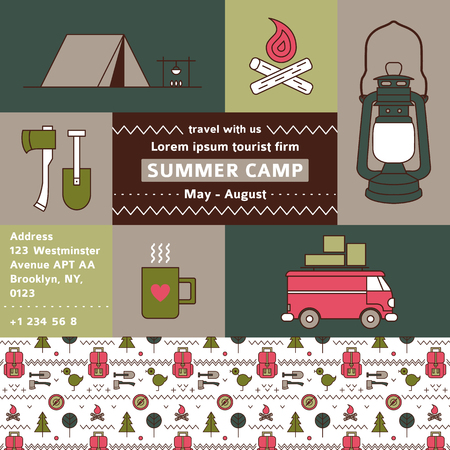1. Why Zero-Waste Matters in Camp Cooking
When we head into the great outdoors, the goal is usually to enjoy nature, not harm it. But camp cooking often creates more trash than we realize—from plastic packaging to single-use utensils and leftover food waste. Choosing a zero-waste approach while camping isnt just trendy—its a way to protect the environment, reduce our impact on wildlife, and make sure future generations can enjoy the same trails, lakes, and forests we do today.
The Hidden Environmental Impact of Camp Waste
Every piece of trash that ends up in nature can take years—or even centuries—to break down. Plastics can leach harmful chemicals into the soil and waterways. Food scraps may seem harmless, but they can attract wildlife and disrupt natural behaviors. Even biodegradable items like fruit peels or paper can take much longer to decompose in wild environments compared to landfills.
| Common Camp Waste | Impact on Nature |
|---|---|
| Plastic wrappers | Pollute ecosystems, harm animals if ingested |
| Leftover food | Attracts wildlife, causes dependency on human food |
| Disposable utensils/plates | Create landfill waste, often non-recyclable |
| Canned goods packaging | Adds unnecessary weight and trash volume |
How Low-Waste Cooking Helps the Outdoors
A low-waste cooking strategy means less trash to pack out, fewer critters sneaking around your tent at night, and a cleaner campsite for the next camper. It also encourages us to be more mindful of what we bring—and eat—which often leads to healthier meals and better organization overall.
The Benefits Go Beyond Nature
- Saves Money: Bulk shopping reduces cost per serving.
- Simplifies Packing: Pre-prepped meals mean fewer containers and less clutter.
- Makes Cleanup Easier: Less trash = less mess = more time relaxing by the fire.
A Step Toward Sustainable Adventures
If you love hiking under starry skies or waking up to birdsong near a mountain lake, going low-waste while cooking at camp is one of the best ways to give back to those places. Its a small change with a big ripple effect—helping preserve landscapes, protect animals, and keep outdoor adventures magical for everyone.
2. Smart Bulk Shopping Strategies
Buying in bulk is a game-changer for trash-free camp cooking. Not only does it cut down on packaging waste, but it can also save you money and simplify your meal prep. Heres how to shop smart like a pro camper.
Where to Shop for Bulk Items
Look for stores that offer bulk bins and allow you to bring your own containers. Here are some popular places across the U.S. where you can find package-free options:
| Store Name | What You Can Buy | Bring Your Own Container? |
|---|---|---|
| Whole Foods Market | Grains, nuts, spices, snacks | Yes |
| Sprouts Farmers Market | Dried fruits, pasta, baking goods | Yes |
| Co-op Grocery Stores | Beans, rice, herbs, oils | Yes (most locations) |
| WinCo Foods | Cereals, trail mix, coffee | No (use paper bags provided) |
What to Avoid When Buying in Bulk
Not all bulk items are camp-friendly. Here’s what to steer clear of when prepping for your trip:
- Messy or Melty Items: Chocolate chips or soft candies can melt in the heat.
- Scented Products: Strong-smelling spices or teas may attract wildlife.
- Brittle Containers: Glass jars can break during transport—opt for stainless steel or silicone instead.
How to Pack Bulk Ingredients Without Waste
Ditch single-use plastic bags and opt for reusable containers. Here are some great options for zero-waste packing:
| Packing Material | Best For | Why It Works |
|---|---|---|
| Mason jars with screw tops | Liquids, sauces, dry grains | Airtight and durable (for car camping) |
| Silicone zip bags | Nuts, dried fruits, snacks | Flexible and reusable with no leaks |
| Cotton drawstring bags | Bread, produce, dry goods | Lightweight and breathable; great for dry foods |
| Bento-style metal containers | Sliced veggies, cheese, sandwiches | No plastic needed; keeps food organized and fresh |
Pro Tips for Zero-Waste Bulk Shopping Trips
- Tare Before You Fill: Always weigh your container before filling so youre not paying for the extra weight.
- Create a Master List: Plan meals ahead of time and make a checklist of ingredients you can buy in bulk.
- Label Everything: Use washable markers or tape to label containers with contents and cooking instructions.
- Avoid Impulse Buys: Stick to your list to avoid overbuying or grabbing things that won’t travel well.
The key to trash-free camp cooking starts at the store. With these smart bulk shopping strategies, youll be well on your way to cooking clean and packing light.

3. Prep Like a Camper Chef
Getting ready for a trash-free camping trip starts at home, and how you prep your meals can make all the difference. With a little planning, you can save time at camp, reduce food waste, and avoid single-use packaging. Here are some simple and effective tips to help you prep like a pro camper chef.
Pre-Measure Your Ingredients
Before heading out, measure out spices, oils, grains, and other dry goods into reusable containers or jars. This cuts down on bulky packaging and helps you bring only what you need. No more hauling full bags of flour or salt—you’ll have just the right amount for each meal.
Example: Pre-Measured Ingredients
| Ingredient | Amount Needed | Container Type |
|---|---|---|
| Olive Oil | 1/4 cup | Small leak-proof bottle |
| Sugar | 2 tbsp | Tiny mason jar |
| Cumin Powder | 1 tsp | Pill organizer or spice tin |
Vacuum Seal or Freeze Meals Ahead of Time
If you’re bringing proteins, stews, or pre-cooked grains, vacuum sealing them saves space and extends freshness—plus it reduces the need for ice. You can also freeze meals flat in reusable silicone bags to keep your cooler colder for longer without adding extra ice packs.
Use Reusable Containers for Everything
Ditch disposable plastic bags and opt for stackable, reusable containers made of silicone, stainless steel, or BPA-free plastic. Label each container with its contents and day of use to stay organized at camp. This also helps prevent food from getting squished in your cooler.
Packing Tips Using Reusables
| Meal Type | Packing Method | Sustainability Tip |
|---|---|---|
| Sliced Veggies for Stir Fry | BPA-free stackable container | Add a damp paper towel to keep veggies crisp (use compostable paper) |
| Pasta Salad (Ready-to-Eat) | Mason jar or silicone bowl with lid | No need to reheat = less fuel used at camp |
| Burger Patties (Uncooked) | Parchment-wrapped + sealed in silicone bag | No styrofoam trays = less landfill waste |
A Little Prep Goes a Long Way
The key to stress-free cooking at your campsite is prepping smart. When you plan ahead with portioned ingredients, pre-cooked meals, and eco-friendly storage solutions, youll spend less time cooking and cleaning—and more time enjoying the great outdoors.
4. Pack Efficiently With Reusables
When youre prepping meals for a trash-free camping trip, how you pack is just as important as what you bring. Using reusable containers and eco-friendly storage tools not only keeps your food fresh but also helps you avoid creating unnecessary waste at your campsite.
Smart Storage Tools for Camp Cooking
Swap out disposable plastic bags and single-use wraps with long-lasting alternatives. These options are perfect for both transporting food and storing leftovers while youre in the great outdoors.
| Reusable Tool | Best For | Why It Works |
|---|---|---|
| Beeswax Wraps | Covering fruits, veggies, cheese, or bread | Moldable and breathable, great alternative to plastic wrap |
| Silicone Food Bags | Marinated meats, snacks, sauces | Airtight, leakproof, and freezer-safe—easy to clean and reuse |
| BPA-Free Containers | Meal prepped dishes, salads, grains | Doubles as a serving container at camp |
| Nesting Mess Kits | Eating and cooking on-site | Saves space and eliminates need for disposable plates or utensils |
Packing Tips to Maximize Space and Minimize Waste
- Pre-portion ingredients: If youre making chili or pasta salad, portion out spices and dry ingredients into small silicone bags ahead of time.
- Nest containers: Use stackable or nesting containers to save space in your cooler or dry bag.
- Label everything: Use a washable marker to label contents and cooking instructions directly on reusable bags or lids.
Campsite Bonus: Built-in Cleanup Benefits
Your reusables do double duty—many of them can go straight from storage to serving to cleanup. For example, silicone bags can be rinsed at the campsite and reused throughout the trip. Mess kits typically include a bowl, cup, and utensils that are easy to wash and pack back up without any trash left behind.
5. Creative Recipe Ideas with Minimal Waste
When youre out camping, the goal is to enjoy good food without creating extra trash or wasting ingredients. With a little planning and smart bulk shopping, you can prep meals that are delicious, easy to cook, and leave nothing behind. Here are some meal ideas that use every ingredient, require minimal cleanup, and ditch disposable items altogether.
One-Pot Wonders
One-pot meals are perfect for camp cooking. They reduce dishes and help you combine all your prepped ingredients in a single go. Heres an example of a zero-waste chili you can prep in bulk:
| Ingredient | Bulk Prep Tip | Zero-Waste Use |
|---|---|---|
| Dried beans (black or pinto) | Soak and cook in advance at home | Store in reusable containers; no cans needed |
| Onions & garlic | Pre-chop and store in silicone bags | Use scraps for homemade veggie broth |
| Canned tomatoes (bulk from warehouse club) | Portion into jars before trip | Recycle cans at home before leaving |
| Taco seasoning mix (DIY blend) | Make at home using pantry spices | No single-use packets needed |
Wraps & Bowls That Use It All
Wraps and grain bowls are super versatile and ideal for using up leftover veggies, proteins, and sauces. Prep your fillings ahead of time and pack them in reusable containers. Use tortillas bought in bulk or make your own!
Ideas to Try:
- Breakfast burritos: Scrambled eggs, sautéed veggies, shredded cheese—wrap and heat on the camp stove.
- Mediterranean bowl: Couscous, roasted chickpeas, chopped cucumbers, hummus—all prepped at home.
- Taco night: Set up a DIY bar with beans, rice, slaw, salsa—all packed waste-free.
Mason Jar Meals & Snacks
Mason jars arent just trendy—theyre practical. Layer salads, overnight oats, or pasta salad in jars for grab-and-go meals without plastic wrap or zip bags.
Mason Jar Meal Prep Tips:
- Salads: Dressing on the bottom, sturdy veggies next, greens on top—shake to serve!
- Overnight oats: Mix rolled oats with almond milk, chia seeds, fruit—ready by morning.
- Pasta salad: Cook pasta ahead of time; add cherry tomatoes, olives, vinaigrette—no mess prep.
Smores Reimagined: Less Trash, Same Fun
You don’t need individually wrapped chocolate or marshmallows to enjoy s’mores. Buy ingredients in bulk and pack them in reusable containers instead. Try switching it up with peanut butter or banana slices to use what you already have!
Smores Variations with Bulk Ingredients:
- The Classic: Graham crackers + chocolate squares + marshmallows (all from bulk bins)
- The Banana Boat: Banana slice + nut butter + granola between graham crackers
- The Campfire Cookie: Two oatmeal cookies with chocolate spread and marshmallow fluff
The key is to keep things simple but flavorful—and always think about how each ingredient can be used across multiple meals. With the right recipes and prep strategy, youll not only eat well but camp clean too.
6. Clean-Up Habits That Leave No Trace
When youre out enjoying nature, the last thing you want to do is leave a mess behind—especially in the kitchen. Keeping your camp kitchen clean and eco-friendly isnt just about good manners; its part of following Leave No Trace principles. Heres how to make dish duty more sustainable with smart habits, water-saving tips, and biodegradable products.
Use Biodegradable Soap
Regular dish soap can harm local ecosystems, especially if it ends up in lakes or streams. Always pack a biodegradable soap thats designed for camping. These soaps break down naturally and are safer for plants and wildlife. Just remember: even biodegradable soap should be used at least 200 feet away from any natural water source.
Top Biodegradable Soap Brands for Campers:
| Brand | Features |
|---|---|
| Dr. Bronner’s | Multi-use, concentrated, organic ingredients |
| Campsuds | Effective in hot or cold water, small bottle lasts long |
| Sierra Dawn | Eco-friendly, great for dishes and body wash |
Save Water with Smart Washing Techniques
Water is heavy to carry and precious when you’re off-grid. Save it by using a two-basin wash system—one basin with soapy water and another with clean rinse water. Scrape off food scraps before washing to keep your wash water cleaner longer.
Two-Basin Dish Washing System:
- Basin 1 – Wash: Fill with warm water and a few drops of biodegradable soap.
- Basin 2 – Rinse: Fill with clean water to rinse off soap residue.
- Towel Dry: Use a clean dish towel or let air dry on a mesh rack.
Create a Sustainable Dish Routine
A consistent dish routine keeps everyone on track and reduces waste. If youre camping with a group, assign rotating dish duty so no one gets stuck doing it all weekend. Use reusable scrubbers instead of disposable sponges, and bring along collapsible drying racks to save space.
Quick Tips for Trash-Free Clean-Up:
- Avoid paper towels—use washable cloth rags instead.
- Dry scrape plates before washing to reduce food bits in your graywater.
- Strain food particles from used water before disposing of it properly—scatter strained water at least 200 feet away from campsites and water sources.
- If youre car camping, bring a sealable container for packing out graywater if required by local rules.
By incorporating these simple yet effective clean-up habits, you’ll keep your campsite tidy without leaving an impact on the environment. It’s all part of being a responsible camper—and it makes cooking outdoors that much more enjoyable.


